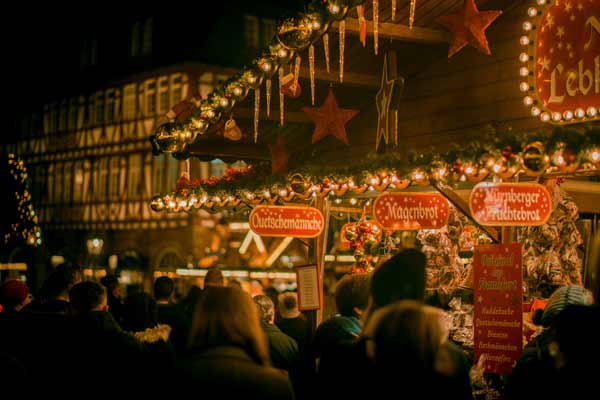As the calendar pages turn to Advent, a timeless magic descends upon towns, cities and villages across Europe and beyond. The air, crisp and cold, carries the festive soundtrack of carols and children wishfully talking to Santa, mingled with the irresistible aroma of cinnamon, cloves, and roasted chestnuts. This is the enduring enchantment of the Christmas Market, a tradition that is as much about community and light as it is about commerce. The story of this familiar festive charm began more than six centuries ago; a tale of faith, food, and community that has come to define the spirit of Christmas itself.
The precursors to the modern Christmas market appeared in the German-speaking territories of the Holy Roman Empire. They were often referred to as “winter markets” or “December markets” and were vital gatherings that allowed townspeople to stock up on essentials like meat, cheese, and hardy winter tools before heavy snows made travel perilous. The earliest example of this is often cited as the December market in Vienna in 1298, when Emperor Albrecht I granted citizens the right to hold the market in order to gather supplies for winter.
The real transformation happened in Germany during the 15th century. Here, in the heart of Saxony, a market opened that would set the template for all others, Dresden’s Striezelmarkt, first held in 1434. The name Striezel refers to a rich, buttery fruit bread baked for the season, what we now know as Stollen. The simple loaf, dusted with snowy sugar, became a symbol of Christmas in Dresden and beyond. Even today, the market’s centrepiece is a towering “Stollen Mountain”, and each December the city hosts the Stollenfest, a parade celebrating this centuries-old delicacy.
From Dresden, the idea of the Christmas market spread quickly. Nuremberg introduced its Christkindlesmarkt, dedicated to the Christ Child, and Frankfurt and Munich soon followed. These gatherings became a blend of devotion and delight, places where townspeople could celebrate Advent together, buy handmade gifts, and indulge in seasonal treats. Candle makers offered their wares, artisans sold carved toys, and the comforting scent of gingerbread, nuts and hot wine filled the frosty air.
The tradition crossed borders and Strasbourg launched its first Christmas market in 1570, as Christkindelsmärik, making it one of the oldest in Europe outside Germany. Over time, these winter markets became cherished fixtures of city life, festive rituals that turned dark, cold streets into scenes of light and laughter.
The idea of a Christmas market reached Britain much later. The first German-style market appeared in Lincoln in 1982, inspired by the city’s twinning with Neustadt in Germany. Its success sparked a national revival and soon towns from Bath to Birmingham, Edinburgh to Winchester, were hosting their own glowing celebrations. Each of them adding a distinctly British character while keeping the German heart intact.
Today, Christmas markets have become a global phenomenon, found in cities from Dresden to New York, Vienna to Tokyo. Yet wherever they appear, the essence remains unchanged: warmth, community, and the comforting promise of festive cheer. Beneath the twinkling lights and the scent of Stollen baking, we find something timeless, a reminder that even in the darkest days of winter, there is joy to be found. Harrogate is no exception and plays host to a magnificent Christmas market. Harrogate Christmas Fayre takes place between 5 and 14 December 2025, with up to forty wonderfully decorated chalets offering both local artisan goods and traditional European Christmas market delights, with mouth-watering treats along the way.




